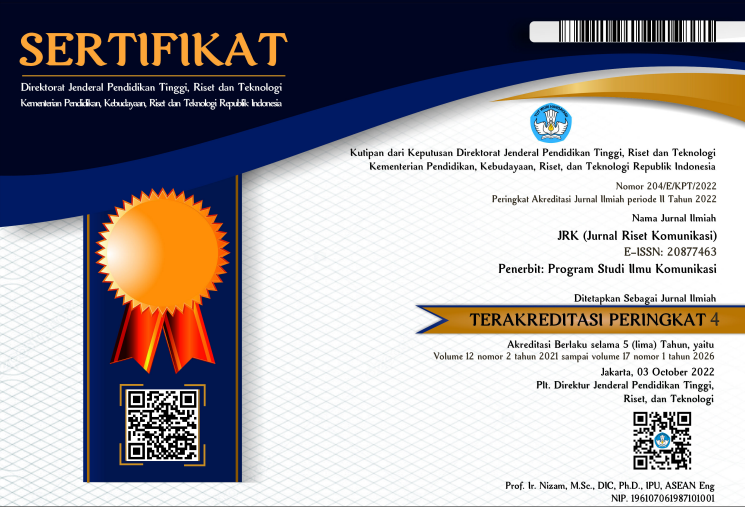Kenapa Generasi Muda Menghindari Berita Politik?: Studi Pengaruh News Avoidance dan Partisipasi Politik di Pemilu 2024
Abstract
Penelitian ini meneliti pengaruh penghindaran berita politik terhadap partisipasi politik pemilih muda, khususnya Generasi Z, dalam Pemilihan Presiden 2024. Menggunakan Theory of Planned Behavior, penelitian ini mengkaji apakah penghindaran berita politik memengaruhi perilaku memilih. Data diperoleh melalui survei terhadap 400 responden dari 30 provinsi di Indonesia. Hasilnya menunjukkan bahwa meskipun banyak pemilih muda menghindari berita politik karena beragam faktor, hal ini tidak selalu mengurangi partisipasi politik mereka. Sebaliknya, pemilih muda tetap aktif berdiskusi tentang pemilu dan berpartisipasi dalam memilih. Secara statistik juga tidak ditemukan pengaruh dari news avoidance pada partisipasi politik mereka. Penelitian ini menyoroti dinamika kompleks antara konsumsi media dan keterlibatan politik.
Full Text:
344-372 PDF (Indonesian)References
Ajzen, I. (1991). The theory of planned behavior. Organizational Behavior and Human Decision Processes, 50(2), 179–211. https://doi.org/10.1016/0749-5978(91)90020-t
Azari, M. N., & Setianto, Y. P. (2021). Gender, Konsumsi Berita COVID-19 dan News Fatigue di Jakarta. Jurnal Kajian Jurnalisme, 5(1), 1. https://doi.org/10.24198/jkj.v5i1.31587
Badan Pusat Statistik. (2020). Jumlah Penduduk menurut Wilayah, Klasifikasi Generasi, dan Jenis Kelamin Tahun 2020 [Dataset]. https://sensus.bps.go.id/topik/tabular/sp2020/2/1/4
Bayu, D. J. (2020, December 17). Media Daring Jadi Sumber Berita Utama Generasi Muda. Katadata. https://databoks.katadata.co.id/datapublish/2020/12/17/media-daring-jadi-sumber-berita-utama-generasi-muda
Betakova, D., Boomgaarden, H. G., Lecheler, S., & Schäfer, S. (2024). I do not (Want to) know! the relationship between intentional news avoidance and low news consumption. Mass Communication & Society, 1–28. https://doi.org/10.1080/15205436.2024.2304759
Bode, L., Vraga, E. K., & Troller-Renfree, S. (2017). Skipping politics: Measuring avoidance of political content in social media. Research & Politics, 4(2). https://doi.org/10.1177/2053168017702990
Chen, J. (2014). Old society, new youths : an overview of youth and popular participation in post-reformasi Indonesia. NTU Singapore. https://hdl.handle.net/10356/101884
De Bruin, K., De Haan, Y., Vliegenthart, R., Kruikemeier, S., & Boukes, M. (2021). News Avoidance during the Covid-19 Crisis: Understanding Information Overload. Digital Journalism, 9(9), 1286–1302. https://doi.org/10.1080/21670811.2021.1957967
Departemen Politik dan Perubahan Sosial CSIS. (2022). Rilis Survei Pemilih Muda dan Pemilu 2024: Dinamika dan Preferensi Sosial Politik Pascapandemi. https://csis.or.id/publication/rilis-survei-pemilih-muda-dan-pemilu-2024-dinamika-dan-preferensi-sosial-politik-pascapandemi/
Dimock, M. (2019). Defining generations: Where Millennials end and Generation Z begins. Pew Research Center. https://pewrsr.ch/2szqtJz
Downing, S. M. (2004). Reliability: on the reproducibility of assessment data. Medical Education, 38(9), 1006–1012. https://doi.org/10.1111/j.1365-2929.2004.01932.x
Edgerly, S. (2021). The head and heart of news avoidance: How attitudes about the news media relate to levels of news consumption. Journalism, 1. https://doi.org/10.1177/14648849211012922
Edgerly, S., Vraga, E. K., Bode, L., Thorson, K., & Thorson, E. (2017). New media, new relationship to participation? A closer look at youth news repertoires and political participation. Journalism & Mass Communication Quarterly, 95(1), 192–212. https://doi.org/10.1177/1077699017706928
Effendi, S. (2012). Unsur-unsur penelitian survei. In S. Effendi & Tukiran (Eds.), Metode penelitian survei. LP3ES.
Fernandes, A., Suryahudaya, E. G., & Okthariza, N. (2022). Pemilih Muda Dalam Pemilihan Umum 2024: Dinamis, Adaptif dan Responsif. Departemen Politik dan Perubahan Sosial CSIS. https://www.csis.or.id/publication/pemilih-muda-dalam-pemilihan-umum-2024-dinamis-adaptif-dan-responsif/
Ghozali, I. (2018). Aplikasi Analisis Multivariate Dengan Program IBM SPSS 25 (9th ed.). Badan Penerbit Universitas Diponegoro.
Glejser, H. (1969). A new test for heteroskedasticity. Journal of the American Statistical Association, 64(325), 316–323. https://doi.org/10.1080/01621459.1969.10500976
Goyanes, M., Ardèvol‐Abreu, A., & De Zúñiga, H. G. (2021). Antecedents of news avoidance: competing effects of political interest, news overload, trust in news media, and “News finds me” perception. Digital Journalism, 11(1), 1–18. https://doi.org/10.1080/21670811.2021.1990097
Hao, X., Ning, W., & George, C. (2014). The impact of online news consumption on young people’s political participation. International Journal of E-politics. https://doi.org/10.4018/ijep.2014040102
Ho, S. S., Liao, Y., & Rosenthal, S. (2014). Applying the Theory of Planned Behavior and Media Dependency Theory: Predictors of Public Pro-environmental Behavioral Intentions in Singapore. Environmental Communication, 9(1), 77–99. https://doi.org/10.1080/17524032.2014.932819
Homyamyen, P., & Kulachai, W. (2023). Understanding Political Participation: A Theory of Planned Behavior Approach. In Advances in economics, business and management research (pp. 231–237). https://doi.org/10.2991/978-94-6463-244-6_37
Komisi Pemilihan Umum. (2023). Rekapitulasi Daftar Pemilih Tetap (DPT) Dalam Negeri Pemilu Tahun 2024 [Dataset]. Pusdatin KPU. https://opendata.kpu.go.id/dataset/3af73316d-6f826961c-613979c81-8e311
Kovach, B., & Rosenstiel, T. (2003). Sembilan Elemen Jurnalisme (Y. A. Pareanom, Trans.). Yayasan Pantau.
KPU. (n.d.). Hasil Hitung Suara Pemilu Presiden & Wakil Presiden RI 2019 [Dataset]. https://pemilu2019.kpu.go.id/#/ppwp/hitung-suara/
Kriyantono, R. (2006). Teknis Praktis Riset Komunikasi. Kencana.
Lee, J., McGuinness, K., Park, S., Fisher, C., Yao, P., Chatskin, M., & McCallum, K. (2023). Women and News Special Report: Gender Gaps in news consumption and engagement. News and Media Research Centre, University of Canberra. https://doi.org/10.26191/febf-hz61
Marcinkowski, F., & Metag, J. (2014). Why Do Candidates Use Online Media in Constituency Campaigning? An Application of the Theory of Planned behavior. Journal of Information Technology & Politics, 11(2), 151–168. https://doi.org/10.1080/19331681.2014.895690
Moleong, L. J. (2010). Metode penelitian kualitatif. PT Remaja Rosdakarya.
Newman, N., Fletcher, R., Eddy, K., Robertson, C. T., & Nielsen, R. K. (2023). Digital News Report 2023. Reuters Institute for the Study of Journalism. https://reutersinstitute.politics.ox.ac.uk/digital-news-report/2023
Newman, N., Fletcher, R., Kalogeropoulos, A., Levy, D. a. L., & Nielsen, R. K. (2017). Reuters Institute Digital News Report 2017. Reuters Institute for the Study of Journalism. https://www.digitalnewsreport.org/survey/2017/
Newman, N., Fletcher, R., Kalogeropoulos, A., & Nielsen, R. K. (2019). Reuters Institute Digital News Report 2019. Reuters Institute for the Study of Journalism. https://www.digitalnewsreport.org/survey/2019/
Newman, N., Fletcher, R., Schulz, A., Andi, S., Robertson, C. T., & Nielsen, R. K. (2021). Reuters Institute Digital News Report 2021. Reuters Institute for the Study of Journalism. https://reutersinstitute.politics.ox.ac.uk/digital-news-report/2021
Ni, T., Zhu, R., & Krever, R. (2023). Responses to news overload in a Non-Partisan environment: News avoidance in China. SAGE Open, 13(3). https://doi.org/10.1177/21582440231184864
Nurgiyantoro, B., Gunawan, & Marzuki. (2017). Statistik Terapan untuk Penelitian Ilmu Sosial: Teori & praktik dengan IBM SPSS Statistic 21. Gadjah Mada University Press.
Ohme, J., De Bruin, K., De Haan, Y., Kruikemeier, S., Van Der Meer, T. G., & Vliegenthart, R. (2022). Avoiding the news to participate in society? The longitudinal relationship between news avoidance and civic engagement. Communications, 0(0). https://doi.org/10.1515/commun-2021-0099
Palmer, R., & Toff, B. (2020). What Does It Take to Sustain a News Habit? The Role of Civic Duty Norms and a Connection to a “News Community” Among News Avoiders in the UK and Spain. International Journal of Communication, 14(20). https://ijoc.org/index.php/ijoc/article/view/12252
Pundir, V., Devi, E. B., & Nath, V. (2021). Arresting fake news sharing on social media: a theory of planned behavior approach. Management Research Review, 44(8), 1108–1138. https://doi.org/10.1108/mrr-05-2020-0286
Putri Yolanda, H., & Halim, U. (2020). Partisipasi Politik Online Generasi Z Pada Pemilihan Presiden Indonesia 2019. CoverAge: Journal of Strategic Communication, 10(2), 30–39. https://doi.org/10.35814/coverage.v10i2.1381
Ramadhan, B. (2023, July 3). 56 Persen Pemilih Pemilu 2024 dari Kelompok Gen Z dan Milenial. Republika Online. https://news.republika.co.id/berita/rx72ap330/56-persen-pemilih-pemilu-2024-dari-kelompok-gen-z-dan-milenial
Ryan, M. J., & Worthington, A. K. (2021). Theory of planned behavior. In Persuasion Theory in Action: An Open Educational Resource. LibreTexts. https://socialsci.libretexts.org/Bookshelves/Communication/Argument_and_Debate/Persuasion_Theory_in_Action_(Worthington)/02%3A_Theory_of_Planned_Behavior
Sadewo, J. (2021, December 19). Survei Indopol: Mayoritas Generasi Z dan Milenial Kurang Informasi Politik. Republika Online. https://www.republika.co.id/berita/r4crv9318/survei-indopol-mayoritas-generasi-z-dan-milenial-kurang-informasi-politik
Sarwono, J. (2012). Metode Riset Skripsi: Pendekatan Kuantitatif (Menggunakan Prosedur SPSS). PT Elex Media Komputindo.
Saud, M., & Margono, H. (2021). Indonesia’s rise in digital democracy and youth’s political participation. Journal of Information Technology & Politics, 18(4), 443–454. https://doi.org/10.1080/19331681.2021.1900019
Schmidt, A. F., & Finan, C. (2018). Linear regression and the normality assumption. Journal of Clinical Epidemiology, 98, 146–151. https://doi.org/10.1016/j.jclinepi.2017.12.006
Setianto, Y. P., & Praceka, P. A. (2023). One year later, why are people still avoiding COVID-19 news?: Understanding Predictors of news avoidance in Indonesia. Jurnal Komunikasi: Malaysian Journal of Communication, 39(3), 60–80. https://doi.org/10.17576/jkmjc-2023-3903-04
Sihombing, S. O., & Pramono, R. (2021). The integration of social media to the theory of planned Behavior: a case study in Indonesia. Journal of Asian Finance, Economics and Business, 8(5), 445–454. https://doi.org/10.13106/jafeb.2021.vol8.no5.0445
Singarimbun, M. (2012). Metode dan proses penelitian. In S. Effendi & Tukiran (Eds.), Metode penelitian survei. LP3ES.
Skovsgaard, M., & Andersen, K. (2019). Conceptualizing News Avoidance: Towards a Shared Understanding of Different Causes and Potential Solutions. Journalism Studies, 21(4), 459–476. https://doi.org/10.1080/1461670x.2019.1686410
Strömbäck, J., & Shehata, A. (2018). Political Journalism. Oxford Research Encyclopedia of Communication. https://doi.org/10.1093/acrefore/9780190228613.013.859
Sugiyono. (2013a). Metode Penelitian Kuantitatif, Kualitatif, dan R&D. ALFABETA.
Sugiyono. (2013b). Metode Penelitian Manajemen. Penerbit Alfabeta.
Taniredja, T., & Mustafidah, H. (2011). Penelitian Kuantitatif (Sebuah Pengantar). Penerbit Alfabeta.
Toff, B., & Kalogeropoulos, A. (2020). All the News That’s Fit to Ignore. Public Opinion Quarterly, 84(S1), 366–390. https://doi.org/10.1093/poq/nfaa016
Toff, B., & Nielsen, R. K. (2022). How news feels: anticipated anxiety as a factor in news avoidance and a barrier to political engagement. Political Communication, 39(6), 697–714. https://doi.org/10.1080/10584609.2022.2123073
Toff, B., & Palmer, R. A. (2018). Explaining the gender gap in news avoidance: “News-Is-for-Men” perceptions and the burdens of caretaking. Journalism Studies, 20(11), 1563–1579. https://doi.org/10.1080/1461670x.2018.1528882
Turner, A. (2015). Generation Z: Technology and Social Interest. The Journal of Individual Psychology, 71(2), 103–113. https://doi.org/10.1353/jip.2015.0021
Uhlaner, C. J. (2015). Politics and participation. In Elsevier eBooks (pp. 504–508). https://doi.org/10.1016/b978-0-08-097086-8.93086-1
Villi, M., Aharoni, T., Tenenboim-Weinblatt, K., Boczkowski, P. J., Hayashi, K., Mitchelstein, E., Tanaka, A., & Kligler-Vilenchik, N. (2021). Taking a Break from News: A Five-nation Study of News Avoidance in the Digital Era. Digital Journalism, 10(1), 148–164. https://doi.org/10.1080/21670811.2021.1904266
Walliman, N. (2016). Research methods: The Basics.
Willnat, L., Wong, W. J., Tamam, E., & Aw, A. (2013). Online Media and Political Participation: The Case of Malaysia. Mass Communication and Society, 16(4), 557–585. https://doi.org/10.1080/15205436.2012.734891
Yoldaş, Z. B. (2015). Civic Education and Learning Democracy: Their Importance for Political Participation of Young People. Procedia - Social and Behavioral Sciences, 174, 544–549. https://doi.org/10.1016/j.sbspro.2015.01.703
DOI: http://dx.doi.org/10.31506/jrk.v15i1.29222
Refbacks
- There are currently no refbacks.









